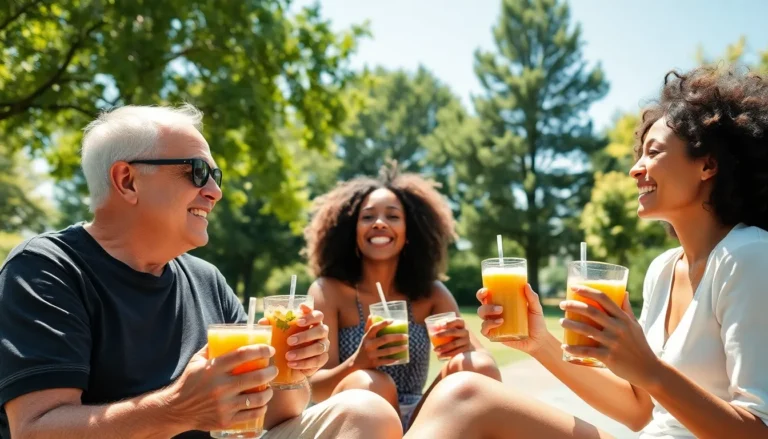Pop culture is like a roller coaster ride—thrilling, unpredictable, and often leaving you questioning your life choices. From unforgettable movie lines to viral dance crazes, these moments shape the way we connect, laugh, and sometimes cringe together. They’re the shared experiences that spark conversations at parties and fuel debates on social media.
Table of Contents
ToggleDefining Pop Culture Moments
Pop culture moments shape society and influence individual experiences. These events can spark connections, prompt conversations, and create shared cultural touchpoints.
Impact on Society
Cultural phenomena often drive societal change. They reflect values, challenge norms, and inspire movements. For example, the emergence of social media platforms has transformed how people engage with entertainment, news, and each other. Shows like “Game of Thrones” or “Friends” bring viewers together, fostering a sense of community. These collective experiences create dialogues that resonate beyond the screen, impacting attitudes and beliefs across diverse demographics.
Importance of Nostalgia
Nostalgia plays a key role in pop culture’s influence on individuals. Familiar songs, movies, and television shows often evoke cherished memories from the past. This emotional connection can strengthen brand loyalty and drive consumer behavior. For instance, remakes of classic films or reboots of beloved series tap into this sentiment, appealing to both older and younger audiences. Collectively, nostalgia connects generations and reinforces shared cultural identities, making past cultural moments relevant today.
Iconic TV Shows and Movies
Iconic television shows and movies create lasting impressions on audiences, shaping pop culture trends for generations. These productions not only entertain but also serve as cultural landmarks.
Groundbreaking Series
Groundbreaking series redefine television standards and storytelling techniques. “The Sopranos” revolutionized the crime drama genre with its complex characters and moral ambiguity. “Breaking Bad” intricately depicted a high school teacher’s descent into the drug trade, offering a fresh perspective on antiheroes. “The Wire” presented an unflinching look at Baltimore’s socio-economic issues, earning critical acclaim for its authenticity. Each series sparked conversations, pushed boundaries, and influenced countless creators.
Cult Classics
Cult classics resonate deeply with dedicated fanbases. “The Rocky Horror Picture Show,” with its unconventional themes and interactive screening experience, became a midnight movie staple. “Fight Club” challenged societal norms through its exploration of identity and consumerism, establishing a loyal following. Likewise, “The Big Lebowski” garnered a cult following with its quirky characters and memorable one-liners. These films maintain relevance through strong fan engagement and constant references in contemporary media, proving their enduring power.
Legendary Music Performances
Memorable music performances create lasting impressions, showcasing talent and cultural impact. Revolutionary moments captivate audiences and redefine musical landscapes.
Live Concerts That Changed History
Historic concerts often alter music trajectories. The 1969 Woodstock Festival gathered nearly 400,000 people, symbolizing peace and love during a turbulent time. Whitney Houston’s national anthem performance during Super Bowl XXV in 1991 resonated deeply, becoming an anthem for unity. Another pivotal moment, Queen’s performance at Live Aid in 1985, revitalized Freddie Mercury’s legacy. Beyoncé’s Coachella performance in 2018 celebrated black culture and empowerment, setting a new standard for festival acts. Each concert exemplifies how live music can galvanize movements and inspire generations.
Iconic Music Videos
Influential music videos have transformed how artists connect with audiences. Michael Jackson’s “Thriller” not only heightened industry standards but also introduced cinematic storytelling in music. Beyoncé’s “Formation,” released in 2016, empowered the Black Lives Matter movement and initiated vital conversations. “Smells Like Teen Spirit” by Nirvana encapsulated the disillusionment of a generation, making it a staple in the grunge era. Shakira and Jennifer Lopez’s Super Bowl LIV halftime show showcased Latin culture and diversity, drawing global attention. These videos shaped cultural narratives and offered platforms for social commentary.
Influential Fashion Trends
Fashion trends have long wielded power over society, shaping attitudes and identities. Iconic styles often reflect cultural moments and resonate deeply with individuals.
Fashion Statements That Shook the World
The mini skirt shocked the fashion world in the 1960s, symbolizing liberation and youth rebellion. Denim jeans transformed from workwear to a staple across generations. The power suit emerged in the 1980s, representing female empowerment in the workplace. Today, trends like oversized clothing and bold logos evoke nostalgia while making strong statements. Each of these moments not only influenced style but also reflected shifts in societal attitudes.
The Rise of Streetwear
Streetwear connected urban culture with high fashion, emerging in the late 20th century. Brands like Supreme and Off-White gained popularity, blending casual attire with luxury elements. Sneakers became a focal point of self-expression and social status, with limited-edition releases driving immense demand. Collaborations between streetwear and high fashion blurred traditional boundaries, allowing designers to explore new creative avenues. Influencers and celebrities further elevated this trend, showcasing how streetwear shapes identity and lifestyle choices.
Viral Internet Phenomena
Viral internet phenomena capture attention and create widespread cultural impact. Memes and social media trends define modern pop culture, shaping conversations and connections.
Memes That Made History
Memes often reflect the zeitgeist and become symbols of collective humor. The “Distracted Boyfriend” meme illustrates relatable scenarios, highlighting distractions in relationships. “Woman Yelling at Cat” combines humor with absurdity, resonating across demographics. Additionally, the Ice Bucket Challenge raised awareness and funds for ALS, illustrating memes’ power beyond entertainment. The “Kombucha Girl” meme brings authenticity, showcasing genuine reactions that people connect with. Each meme has contributed uniquely to cultural conversations, shaping narratives in everyday life.
Social Media’s Role in Pop Culture
Social media revolutionizes how individuals engage with pop culture. Platforms like Twitter and Instagram amplify trends and enable real-time discussions. Viral hashtags create instant communities around shared interests and experiences. Users can disseminate content rapidly, allowing moments to resonate globally within minutes. Influencers shape perceptions by sharing music, fashion, and pop culture news, impacting followers’ choices. Engagement metrics reveal trends, guiding content creation and consumption. Social media continues to transform entertainment, allowing people to interact in unprecedented ways.
Pop culture moments are more than fleeting trends; they’re powerful forces that shape society and create lasting connections. These cultural phenomena resonate across generations and reflect shared experiences that unite individuals. Whether through iconic films, memorable music performances, or influential fashion, pop culture continues to evolve while maintaining its ability to inspire and provoke thought.
As social media amplifies these experiences, the impact of pop culture becomes even more pronounced. It fosters dialogue and community, allowing people to engage with their favorite moments in real-time. Ultimately, the enduring nature of pop culture reminds us of its role in shaping our identities and collective memories, proving that its influence is far from over.




